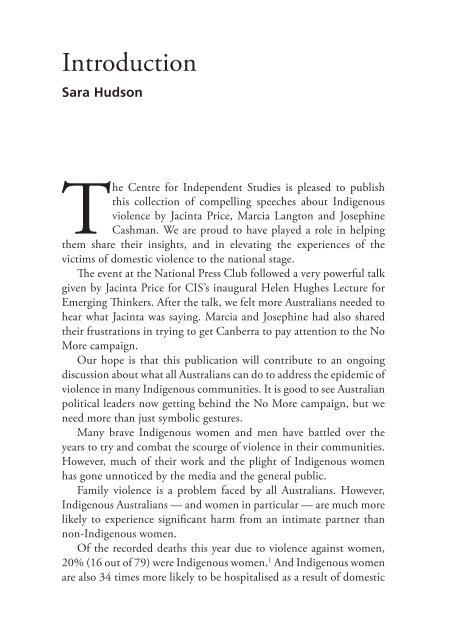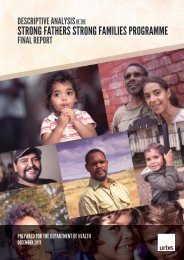Ending the Violence in Indigenous Communities
op152
op152
Create successful ePaper yourself
Turn your PDF publications into a flip-book with our unique Google optimized e-Paper software.
Introduction<br />
Sara Hudson<br />
The Centre for Independent Studies is pleased to publish<br />
this collection of compell<strong>in</strong>g speeches about <strong>Indigenous</strong><br />
violence by Jac<strong>in</strong>ta Price, Marcia Langton and Joseph<strong>in</strong>e<br />
Cashman. We are proud to have played a role <strong>in</strong> help<strong>in</strong>g<br />
<strong>the</strong>m share <strong>the</strong>ir <strong>in</strong>sights, and <strong>in</strong> elevat<strong>in</strong>g <strong>the</strong> experiences of <strong>the</strong><br />
victims of domestic violence to <strong>the</strong> national stage.<br />
The event at <strong>the</strong> National Press Club followed a very powerful talk<br />
given by Jac<strong>in</strong>ta Price for CIS’s <strong>in</strong>augural Helen Hughes Lecture for<br />
Emerg<strong>in</strong>g Th<strong>in</strong>kers. After <strong>the</strong> talk, we felt more Australians needed to<br />
hear what Jac<strong>in</strong>ta was say<strong>in</strong>g. Marcia and Joseph<strong>in</strong>e had also shared<br />
<strong>the</strong>ir frustrations <strong>in</strong> try<strong>in</strong>g to get Canberra to pay attention to <strong>the</strong> No<br />
More campaign.<br />
Our hope is that this publication will contribute to an ongo<strong>in</strong>g<br />
discussion about what all Australians can do to address <strong>the</strong> epidemic of<br />
violence <strong>in</strong> many <strong>Indigenous</strong> communities. It is good to see Australian<br />
political leaders now gett<strong>in</strong>g beh<strong>in</strong>d <strong>the</strong> No More campaign, but we<br />
need more than just symbolic gestures.<br />
Many brave <strong>Indigenous</strong> women and men have battled over <strong>the</strong><br />
years to try and combat <strong>the</strong> scourge of violence <strong>in</strong> <strong>the</strong>ir communities.<br />
However, much of <strong>the</strong>ir work and <strong>the</strong> plight of <strong>Indigenous</strong> women<br />
has gone unnoticed by <strong>the</strong> media and <strong>the</strong> general public.<br />
Family violence is a problem faced by all Australians. However,<br />
<strong>Indigenous</strong> Australians — and women <strong>in</strong> particular — are much more<br />
likely to experience significant harm from an <strong>in</strong>timate partner than<br />
non-<strong>Indigenous</strong> women.<br />
Of <strong>the</strong> recorded deaths this year due to violence aga<strong>in</strong>st women,<br />
20% (16 out of 79) were <strong>Indigenous</strong> women. 1 And <strong>Indigenous</strong> women<br />
are also 34 times more likely to be hospitalised as a result of domestic



